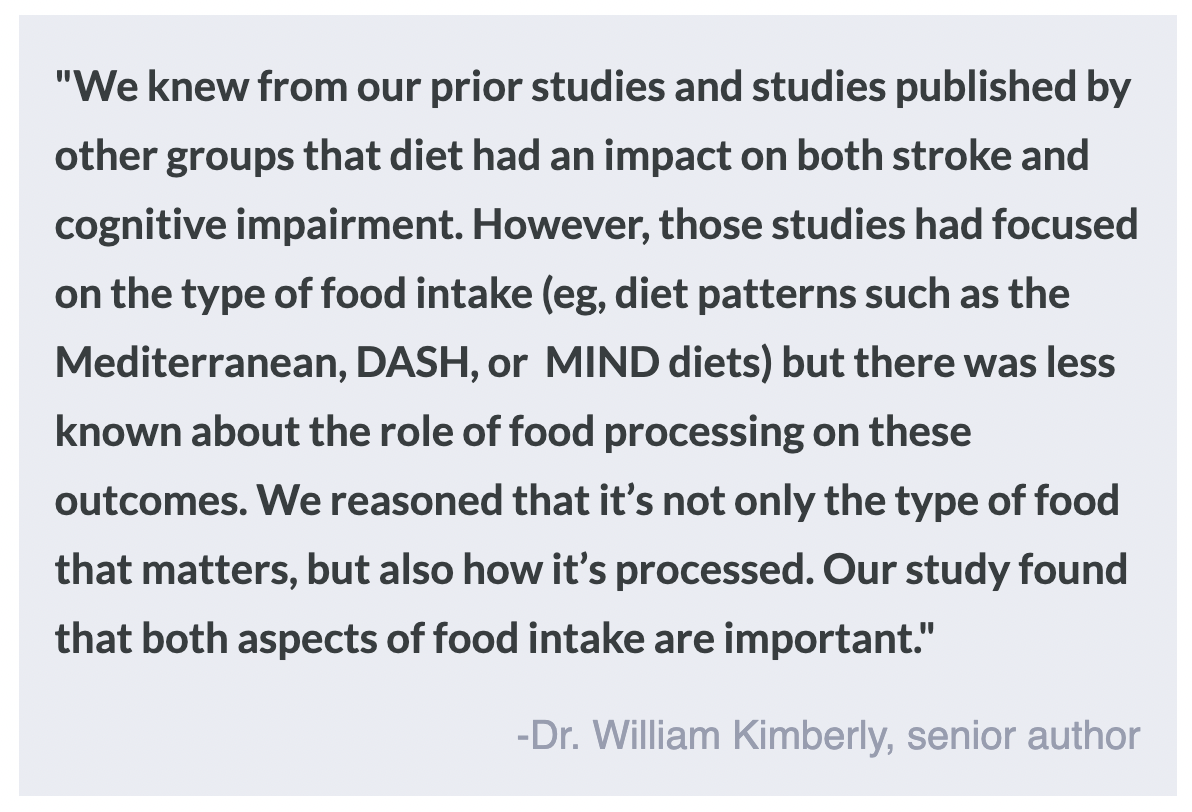Eating Highly Processed Foods is Associated with Stroke and Cognitive Impairment
Post by Shahin Khodaei
The takeaway
Eating more heavily processed foods is associated with an increased risk of cognitive decline and stroke. On the flip side, eating more unprocessed or minimally processed foods is associated with a decreased risk of cognitive decline and stroke.
What's the science?
Diet is known to affect the brain - for example, following a more Mediterranean diet is associated with a reduced risk of stroke and lower cognitive decline. Recent research also indicates that eating more ultra-processed foods (e.g. carbonated drinks, flavoured yogurt, instant foods, packaged bread, chicken nuggets, etc.) is associated with a higher risk of stroke and faster cognitive decline. This week in Neurology, Bhave and colleagues published a study that adds to the growing literature on diet and brain health outcomes, investigating the role of food processing compared to following specific diets such as the Mediterranean diet.
How did they do it?
The authors followed a cohort of over 30,000 non-Hispanic Black and White adults aged 45 and above in the United States, who entered the study between 2003 and 2007. After enrolling in the study, participants were assessed for clinical information, including a history of stroke or cognitive impairments, and demographic and lifestyle information. During the baseline assessment, participants answered a questionnaire about their food intake, which was then analyzed in two ways: 1) The food and drink items were categorized into four groups based on the level of processing, and daily intake for each category (in grams) was divided by total intake to get a proportion. 2) the questionnaires were scored based on how much they adhered to three healthy dietary patterns – Mediterranean, Dietary Approaches to Stop Hypertension (DASH), and Mediterranean-DASH Intervention for Neurodegenerative Delay (MIND).
After this baseline assessment, participants were followed up routinely to assess whether they had experienced a stroke, and to assess their cognitive performance in standardized tests. The authors then built statistical models to investigate the associations between food and drink intake and the incidence of stroke and cognitive impairment.
What did they find?
The study found that eating more ultra-processed foods was associated with an increased risk of stroke, particularly in Black participants. On the other hand, eating more unprocessed/minimally processed foods or more strongly following a healthy diet was associated with a decreased risk of stroke. The results were similar when the authors looked at cognitive impairment – more ultra-processed foods were associated with greater cognitive decline, while less processed foods and healthier diets were associated with less decline.
The authors also asked a follow-up question: does the level of food processing matter if participants are following a healthier dietary pattern such as DASH or MIND? The answer was yes: even when participants adhered to a healthy diet, eating more ultra-processed foods was associated with some negative brain health outcomes, and eating more unprocessed foods was associated with better outcomes. This finding suggests the level of processing in the diet alone, is important for brain health, independently of other dietary patterns.
What's the impact?
This study highlights the important role that food processing plays in brain health. As always, it is important to note that these findings do not necessarily mean that eating more processed foods directly causes stroke and cognitive impairment (i.e. correlation is not causation). However, this study contributes to a growing literature that suggests a healthy diet including unprocessed food is important in maintaining brain health.


